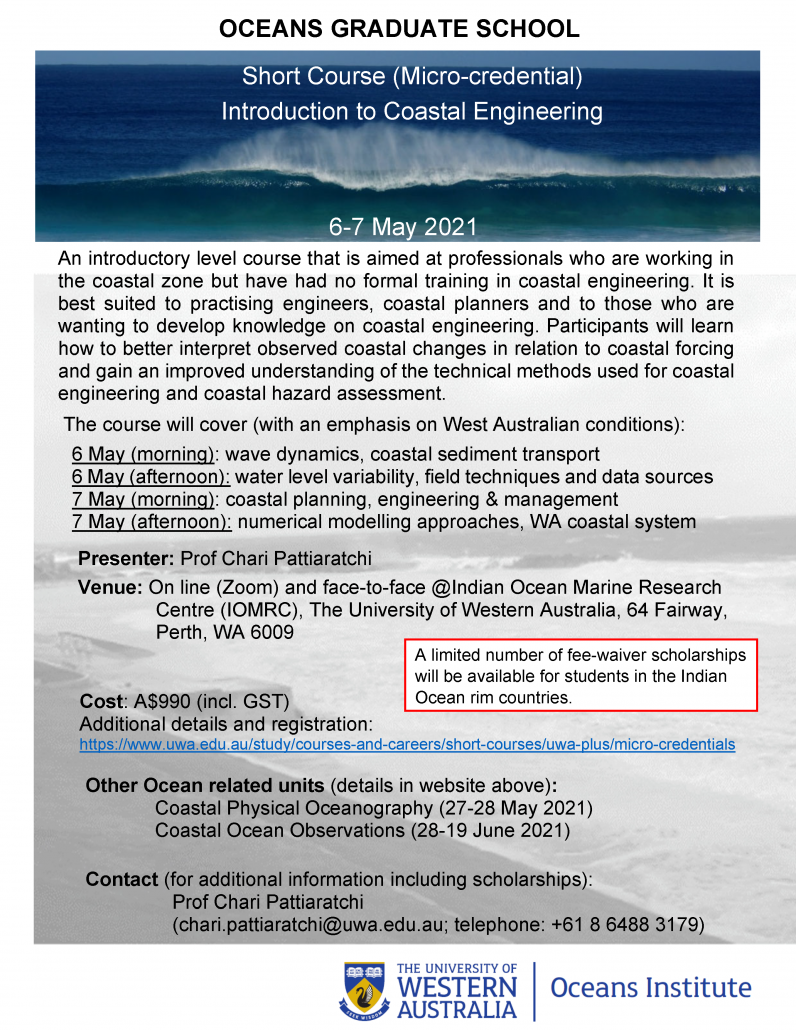Response to maritime accidents in the Indian Ocean: from oil spills to nurdles
Presenter
Charitha Pattiaratchi
Title
Response to maritime accidents in the Indian Ocean: from oil spills to nurdles
Time
Presentation starts at 12.30pm; 29 July 2021
Location
This seminar is being held in the Auditorium, IOMRC building and via Zoom
RSVP
Please RSVP by emailing chari.pattiaratchi@uwa.edu.au and advise if you wish to attend in person or via Zoom
Abstract
Over the past 12 months there have been several maritime accidents in the Indian Ocean that resulted in long-term damage to the marine environment through oil spills and nurdles (plastic pellets) among others. These include oil spills associated with MV Wakashio in Mauritius and MT Diamond in Sri Lanka, respectively and nurdles spill from MV X-Press Pearl in Sri Lanka. In all these cases, real-time predictions (forecasts) of oil and nurdles transport were undertaken at UWA at the request of the Governments of Mauritius and Sri Lanka. MV Wakashio ran aground on a coral reef on the south-east coast of Mauritius on 25 July 2020 and on 6 August broke apart releasing ~900 tonnes of heavy bunker oil that impacted coral reefs and mangroves in the local area. The crude oil carrier MT New Diamond was transporting (~270,000 tonnes of crude oil from Kuwait to India. On 3 September 2020, a fire broke on the ship ~65 kilometres off the east coast of Sri Lanka. After burning intermittently for almost a week, the fire was finally extinguished on 11 September 2020. A diesel oil spill that was ~1 km long was observed during this period. However, the local winds and currents were directed offshore and thus the spill did not interact with the shoreline. The container ship MV X-Press Pearl with 1486 containers on board caught fire on 22 May 2021, engulfed the whole ship and lasted for 13 days. Efforts to move the ship into deeper waters failed and the ship remains on the seabed partly submerged. The cargo included 81 containers were carrying hazardous cargo and included 78 tons of low-density polyethylene (LDPE) pellets or nurdles (~3 billion nurdles). The transport of the nurdles was rapid and within days had spread to onto beaches on the west and southern coasts of Sri Lanka. This was aided by winds and currents associated with the south-west monsoon and remote forcing from a tropical cyclone in the Bay of Bengal. Observations of nurdle beachings corresponded well with the predictions made using the UWA oceanographic models. With time, with the reversing monsoons it is predicted, that the nurdles will spread across the whole of northern Indian Ocean.
Bio
Prof Charitha Pattiaratchi is Professor of Coastal Oceanography at the Oceans Graduate School and the Oceans Institute at The University of Western Australia. He leads the IMOS Ocean Glider facility. His research encompass coastal ocean physical processes and their influence on climatic, biological, and geological processes in estuaries, the nearshore and the continental shelf. To date, he has directly supervised more than 285 people (20 doctoral researchers, 75 postgraduate research students and 173 honours/coursework-master’s thesis students). He has published over 500 articles which include 196 in peer-reviewed international journals.
Join from a PC, Mac, iPad, iPhone or Android device:
Please click this URL to start or join: https://uwa.zoom.us/j/81616938681?pwd=UFBNc1BsOUU0aWtDWDliV28vYW9sdz09
Password: 363595
Join from dial-in phone line:
Dial:
+61 861 193 900 ( Perth )
+61 8 7150 1149 ( Adelaide )
+61 2 8015 2088 ( Sydney )
+61 2 8015 6011 ( Sydney )
+61 3 7018 2005 ( Melbourne )
+61 731 853 730 ( Queensland )
Meeting ID: 816 1693 8681
International numbers available: https://uwa.zoom.us/u/kb5dkfgbE
Join from a H.323/SIP room system:
Dial: 81616938681@zoom.aarnet.edu.au
or 103.122.166.55 (Australia)
or 0262227588 ( Zoom Attendant )
Meeting ID: 816 1693 8681
H323/SIP Password: 363595
Or Skype for Business (Lync):
SIP:81616938681.363595@lync.zoom.us

